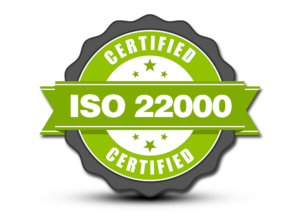
ISO 22000 is an international standard that specifies requirements for a food safety management system (FSMS). It was first published in 2005 by the International Organization for Standardization (ISO). ISO 22000 is based on the Codex Alimentarius principles, which are a collection of food safety standards and guidelines developed by the World Health Organization (WHO) and the Food and Agriculture Organization (FAO).
The purpose of ISO 22000 is to help organizations throughout the food chain ensure the safety of their food products. It does this by providing a framework for managing food safety risks.
The key requirements of ISO 22000 include:
- Top management commitment to food safety: Top management must be committed to food safety and provide the necessary resources to implement and maintain a FSMS.
- Communication: The organization must communicate its food safety policy and objectives to all relevant personnel.
- System planning: The organization must plan and develop its FSMS.
- Implementation and operation: The organization must implement and operate its FSMS.
- Performance monitoring, measurement, analysis, and improvement: The organization must monitor, measure, analyze, and improve its FSMS.
The benefits of implementing ISO 22000 can include:
- Improved food safety: ISO 22000 helps organizations improve the safety of their food products by providing a framework for managing food safety risks.
- Increased customer confidence: ISO 22000 certification can help increase customer confidence in an organization’s food products.
- Improved efficiency of operations: ISO 22000 can help organizations improve the efficiency of their operations by reducing waste and recalls.
- Increased market share: ISO 22000 certification can help organizations increase their market share by demonstrating their commitment to food safety.
If you are interested in implementing ISO 22000, there are a number of resources available to help you, including:
- The ISO website: ISO provides a number of resources on its website, including the ISO 22000 standard itself, guidance documents, and training materials.
- National standards bodies: National standards bodies, such as the American National Standards Institute (ANSI) in the United States and the British Standards Institution (BSI) in the United Kingdom, can also provide guidance and training on ISO 22000.
- Consultants: There are a number of consultants who specialize in helping organizations implement ISO 22000.
Implementing ISO 22000 can be a complex process, but it can be a valuable investment for organizations that are committed to food safety.